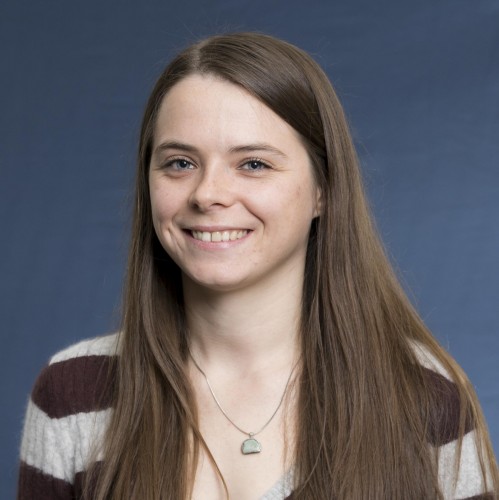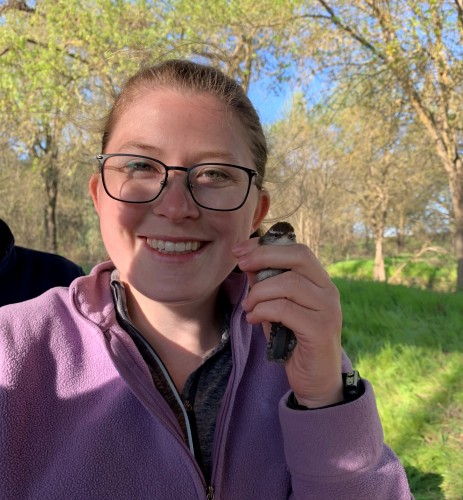Our inaugural 2022 CCSiC Fellows
 Meet the 2022 Fellows of the CCS in
Conservation Fellowship, Tali Caspi, Josephine Hubbard, and Sage
Madden.
Meet the 2022 Fellows of the CCS in
Conservation Fellowship, Tali Caspi, Josephine Hubbard, and Sage
Madden.
Tali Caspi
PhD Candidate, Graduate Group in Ecology
Metabarcoding of fecal DNA to quantify dietary variation among urban coyotes
 Urbanization exposes animals to new
ecological conditions, including alterations in the abundance,
distribution, and quality of food items. Humans in urban areas
often provide food for wildlife, both intentionally (e.g.,
backyard feeders) and inadvertently (e.g., garbage). Some species
that eat human-provided food benefit from these subsidies, but
for many species, food provisioning is not advantageous.
Individuals specializing on anthropogenic food may encounter
people, increasing the potential for human-wildlife conflict.
Urbanization exposes animals to new
ecological conditions, including alterations in the abundance,
distribution, and quality of food items. Humans in urban areas
often provide food for wildlife, both intentionally (e.g.,
backyard feeders) and inadvertently (e.g., garbage). Some species
that eat human-provided food benefit from these subsidies, but
for many species, food provisioning is not advantageous.
Individuals specializing on anthropogenic food may encounter
people, increasing the potential for human-wildlife conflict.
Tali’s research investigates the diet of urban coyotes in San Francisco to describe patterns of individual variation in the nutritional ecology of urban animals. The increasing occurrence of coyotes across cities in the US has coincided with a rising number of reports of human-coyote conflict, making coyotes an important study species. With the help of several community scientists, she is collecting coyote scats throughout the city and quantifying diet using a metabarcoding approach. Metabarcoding is a molecular technique that identifies prey DNA in a predator’s scat, yielding a high-resolution portrait of diet. Tali is developing a community science program for scat collection that trains participants in animal tracking and familiarizes them with iNaturalist, where collections and associated metadata are logged.
Josephine Hubbard
PhD Candidate, Graduate Group in Animal Behavior
Understanding Urban Primate Populations through Citizen Science
 Several species of primates have
been historically introduced to the Florida wetlands (circa
1950s) for the purpose of creating tourist attractions and
destination vacations. However, since those original
translocations occurred many of those institutions have since
been abandoned or closed, leaving those animals to be released
(or escape) into the surrounding ecosystem. Although these
primate populations have largely persisted and grown in the last
half century, there has been very little research conducted on
the current distribution of these populations. To-date efforts by
the Florida Fish and Wildlife Conservation Commission have mapped
confirmed locations of these species (mainly Rhesus macaques:
Macaca mulatta), through passive community sightings (using
locations coupled with photos for species identification).
However, these efforts are patchily distributed and unevenly
sampled, leaving many areas of the state understudied.
Several species of primates have
been historically introduced to the Florida wetlands (circa
1950s) for the purpose of creating tourist attractions and
destination vacations. However, since those original
translocations occurred many of those institutions have since
been abandoned or closed, leaving those animals to be released
(or escape) into the surrounding ecosystem. Although these
primate populations have largely persisted and grown in the last
half century, there has been very little research conducted on
the current distribution of these populations. To-date efforts by
the Florida Fish and Wildlife Conservation Commission have mapped
confirmed locations of these species (mainly Rhesus macaques:
Macaca mulatta), through passive community sightings (using
locations coupled with photos for species identification).
However, these efforts are patchily distributed and unevenly
sampled, leaving many areas of the state understudied.
Josephine proposes to use CCS approaches to systematically perform a repeated “bio-blitz” campaign in order to systematically assess the presence of this species in several counties representative of the six major regions of Florida. She aims to recruit interested naturalists, college students and community members to participate in these sampling events, and will provide them with training and mentorship opportunities throughout the partnership. Participants will participate in a remote training session, and be provided with a digital app where they can record and upload their observations during the bio-blitz events. Participants will also be surveyed before and after to assess the effect of participating in the bio-blitz on their perception of the invasive primate population and potential conservation solutions.
Sage Madden
PhD Student, Graduate Group in Ecology
Project Phoebe: A Citizen and Community Science Nest Monitoring Network
 The goal of this study, which is
part of Sage’s PhD research, is to explore the effects of
exposure to predators and temperature on the behavior and fitness
of a small songbird, the black phoebe, along an urbanization
gradient. Sage plans to recruit volunteers to monitor nesting
attempts of black phoebes on their properties in Sacramento and
Yolo counties. Volunteers will check nest contents every three
days while phoebes are breeding (~March-August). During these
visits, volunteers have opportunities to engage with me and other
field technicians.
The goal of this study, which is
part of Sage’s PhD research, is to explore the effects of
exposure to predators and temperature on the behavior and fitness
of a small songbird, the black phoebe, along an urbanization
gradient. Sage plans to recruit volunteers to monitor nesting
attempts of black phoebes on their properties in Sacramento and
Yolo counties. Volunteers will check nest contents every three
days while phoebes are breeding (~March-August). During these
visits, volunteers have opportunities to engage with me and other
field technicians.
During the pilot field season, she plans to recruit a small group of volunteers using the UC Davis birding club listserv. During two subsequent field seasons, she will recruit a more diverse group of volunteers by using social media platforms (e.g., Nextdoor) and local news, and by sending announcements to organizations such as Latino Outdoors.
Sage intends to use CCS approaches to examine the effects of predators and temperature on urban black phoebes in private residential yards, in addition to public parks. Additionally, her CCS project will involve volunteers in the scientific process, with the aims of increasing scientific literacy, cultivating a sense of place, and fostering conservation ethic. Participation in a similar program, Neighborhood Nestwatch, led to increased knowledge of avian ecology, sense of place, and efforts to improve wildlife habitat in yards.








